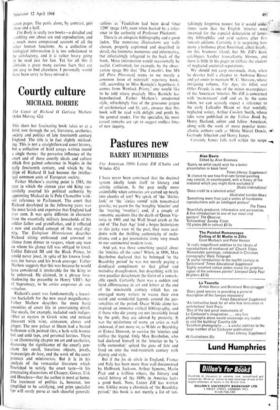Up the windpipe
JOHN ROWAN WILSON
It is claimed by the publisher of this book that the author 'does for the human body what John Gunther has done for the continents of the world.' An awesome thought. I am old enough to remember Mr Gunther's heyday, when no culture or . political system was safe from his remorseless attentions. I had a pic-. tore of Mr Anthony Smith eager-beavering his way through the bloodstream of horno sapien,s, notebook in hand, indefatigably collecting birt.4 of trivial information; and then regurgitating them later in book form, Gunther-fashion, in as to convey the maximum of information with the minimum of enlightenment.
But Mr Smith, for all the misguided 'en- thusiasm of his blurb-writer, is no Gunther. He has an easy readable style, he is widely. educated and well informed. Plainly the idea of writing a straightforward book on human. biology for the intelligent layman was not to his taste. He ranges widely, and sometimes with tenuous relevance to the subject in hand. over literature, history, sociology, zoology and medical history. This method can, at its best, be not only instructive but extremely enter- taining.
It has, however, certain dangers. There are parts of The Body which seem to fall into a habit more characteristic of American than British scientific journalism—that is, a devotiOrt to facts and figures for their own sake. At times the reader has the feeling of being posi- tively belaboured with statistics, some of which can have little significance for a general audience. We are, for instance, told in detail the numbers of every kind of cell present in a pint of blood, the average weight of the spleen, and the exact rope tensions required to close off respectively the jugular veins, the carotid arteries and the trachea. It may be interesting to discover that black men and white men harbour a different type of bedbug, but does anyone feel stirred by the 'knowledge that horses have 205 bones as against 206 for a man? Or that an obscure medical monk named Andrew Boorde had the pedantic habit of sigti- ing himself Andreas Perforatus?
The book is also rather oddly proportioned. Mr Smith himself is conscious of this and defends the fact that some two, thihis of hiS 552-page text is concerned with repioduetiOn. `Mother Nature,' he says, `. . insists that everything is secondary to survival; not. of 'ffie individual but of the species. Without the ability to reproduce there can be no biologicA survival.' True enough—but then, Mother Nature has also insisted that excretion is neces- sary for survival, and it only gets a Wretched
-•
.even pages. The penis alone, by contrast, gets
three and a half.
The Body is really two books—a detailed and ambling one about sex and reproduction, and much more compressed account of all the other human functions. As a collection of biological information it is too unbalanced to be satisfactory, and it is rather heavy going to be read just for fun. Yet for all this it ciintains a great many curious facts that are riot easy to find elsewhere. I personally would have been sorry to have missed it.











































 Previous page
Previous page